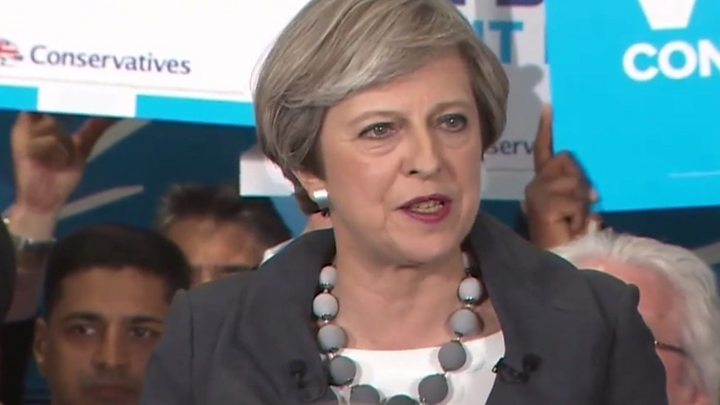
Theresa May has said she will change human rights laws if they "get in the way" of tackling suspected terrorists.
The PM said she would make it easier to deport foreign terror suspects and "restrict the freedom and movements" of those that presented a threat.
Labour said it was "not the message that we should be sending".
Security has dominated the final days of the general election campaign, ahead of Thursday's poll, after the terror attacks in London and Manchester.
Rival parties have been criticising the Tories over police cuts.
Speaking after the London attack, Mrs May said "enough is enough" and that "things need to change" in the terror fight.
Addressing activists in Slough on Tuesday evening, she did not make any specific new policy proposals but said: "I mean longer prison sentences for those convicted of terrorist offences.
"I mean making it easier for the authorities to deport foreign terrorist suspects back to their own countries.
"And I mean doing more to restrict the freedom and movements of terrorist suspects when we have enough evidence to know they are a threat, but not enough evidence to prosecute them in full in court.
"And if our human rights laws get in the way of doing it, we will change the law so we can do it."
Upping the ante
Analysis by the BBC's Laura Kuenssberg
Sources suggest if elected on Friday, Theresa May might consider ideas of curfews, controls on who people can visit and suspects' access to communications.
More controversially, she made it plain that if that means the government would have to change the laws on human rights, she is prepared to do so.
Labour has immediately cried foul, claiming another manifesto U-turn, at almost the last minute of the campaign.
Tory sources deny that flatly, saying they would not pull out of the European Convention on Human Rights but instead, seek fresh derogations - essentially legal opt-outs.
Theresa May's team say she is not, at this late stage, making up last-minute policy, but that the terror risk has changed so fast since the start of the election, that she wanted to make clear that if re-elected she is prepared to toughen the law.
In an interview with The Sun, Mrs May said she would also consider extending the time suspects could be held without charge to 28 days, after it was reduced to 14 days in 2011 under the coalition.
"We said there may be circumstances where it is necessary to do this.
"I will listen to what they [the police and security services] think is necessary for us to do," she said.
The Conservative manifesto committed to remaining in the European Convention on Human Rights - which is separate to the EU - for the whole of the next Parliament. Conservative sources said they would not withdraw from the ECHR but would seek opt-outs called "derogations" from certain aspects.
During last year's Conservative leadership campaign, Mrs May said she personally backed leaving the ECHR - which the UK has been a signatory to since the 1950s - arguing that it made it harder to deport terror suspects and criminals.
But she later said she did not believe there was sufficient support in Parliament for the move.
The Conservatives have said they will reconsider the UK's human rights legal framework after leaving the EU but that the 1998 Human Rights Act will remain in place until that time. The party has long proposed replacing it will a British Bill of Rights.
Labour leader Jeremy Corbyn said the right response was to "halt the Conservative cuts and invest in our police and security services and protect our democratic values, including the Human Rights Act."
And shadow attorney general Baroness Chakrabarti said the PM had "been banging on about her dislike for human rights for a very long time".
She told Newsnight Labour's commitment was to deal with terror suspects within the rule of law and the human rights framework. "Our biggest concern is about resources," she said.
Liberal Democrat leader Tim Farron accused the prime minister of launching a "nuclear arms race" in terror laws. "All she would do is reduce freedom, not terrorism," he said.
Source BBC
No comments:
Post a Comment